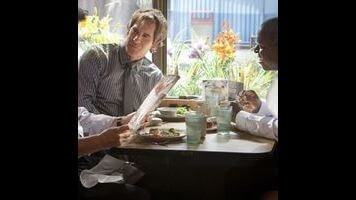Men Of A Certain Age: “And Then The Bill Comes”

Next week brings the last episode of this Men Of A Certain Age half-season, and then the show disappears until the summer, following the split model of so many other successful cable shows. I can’t quibble with cable channels and TV producers doing what they feel they must to compete for viewers—and certainly MOACA stands so much stronger a chance in the summer than it has in December and January that it makes me wonder why TNT didn’t hold back all twelve episodes—but I do wonder if knowing in advance that they’d be working on a bifurcated season affected the writers’ thinking about how to tell stories in season two. Because with “And Then The Bill Comes,” it becomes clearer that these six episodes have really all been one extended story, with any repetition in themes and plot largely intentional. Season one ended with some fairly major changes in the lives of our three principles. Season two, so far, has been about whether those changes will stick.
And frankly, judging by this episode, everything’s looking a little shaky. As the new boss at Thoreau Chevrolet, Owen’s trying to put his own personal stamp on the place, by replacing the Muzak with his old funk and jazz records and by having his salesmen wear costumes for Halloween. He’s even figured out a way to relieve some of the tension between the sales force and the service department, which reaches an all-time high when one of the mechanics throws Lawrence into a dumpster. Owen doesn’t have much luck with his pep talk about how they’re all on the same side, in a war with customers, competitors, other countries, and the government. He does better when he comes up with the idea to expand the garage to take on body work, thereby allowing the repair guys and the sales guys to share in the profits. But when Owen, Sr., gets back from a long fishing trip, he pulls his son aside and explains that while the accounting ledgers may make it look as though the business has plenty of capital on-hand for expansion, the books are actually hiding a delinquent tax payment, prompted by an expensive piece of property that Owen, Sr., bought before the recession hit. So Owen has to abandon his plans for the body shop (and lose some credibility with his staff) and ends the episode staring at an empty lot. Is he making new plans? Is he looking at the property as a metaphor for his failure to build anything of his own? I imagine we’ll have to wait until next week for an answer to that.
Meanwhile, Terry seems to be thriving at Thoreau, so much so that when he picks up his first big paycheck, he buys new shoes and a new TV and makes plans to visit his successful brother Mark out in the suburbs, to bring presents for his nephew’s birthday party. Mark is wary, since he hasn’t seen Terry in a couple of years, and while Terry’s able to win over his other family members with his charm and his gifts—and is even able to soften up Mark a bit, by sharing some memories of their hard-ass father—his brother’s still not entirely convinced that the responsible, well-heeled Terry isn’t just another of the many phases that Terry’s gone through over the years. When Terry tries to give Mark a check to start paying him back for a Jeep that Mark bought him years ago, Mark refuses to take it, figuring that Terry will probably need that money again, sooner or later. Given how fragile Terry’s will can be, it’s possible that he may end up living down to everyone’s expectations. His one potential steadying force? His old acting pal—and new girlfriend—Erin, who dresses up as Lady MacBeth next to his Captain America for Halloween. “So much of life is an act, isn’t it?” they concede to each other.




























![Rob Reiner's son booked for murder amid homicide investigation [Updated]](https://img.pastemagazine.com/wp-content/avuploads/2025/12/15131025/MixCollage-15-Dec-2025-01-10-PM-9121.jpg)











